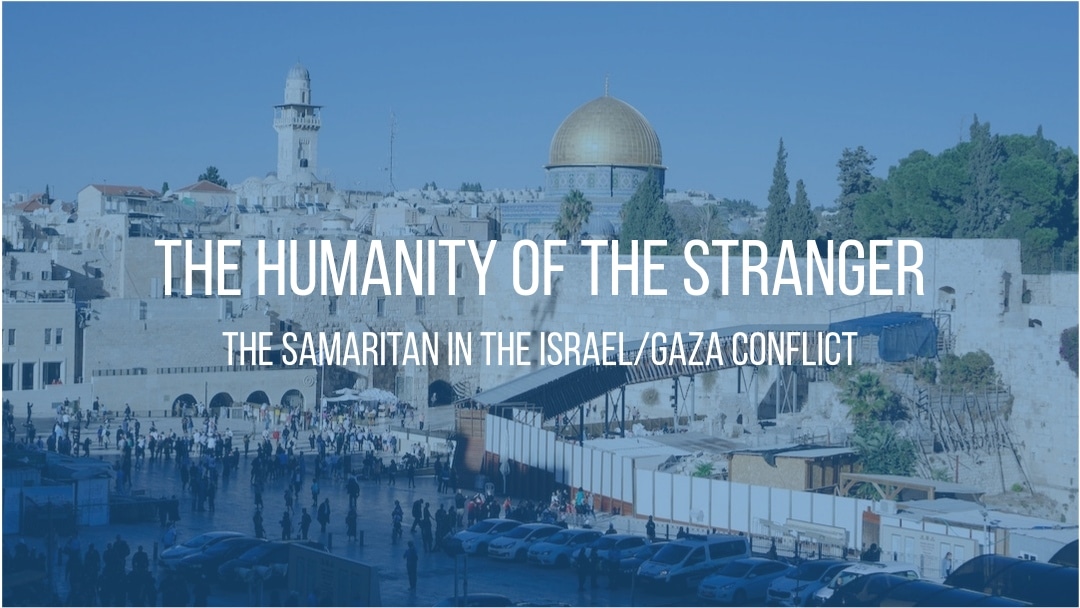Compassion does not demand that we know who is right and who is wrong. In fact, it does not ask for us to know anything at all about [people] except the fact that they are in need.
As I facilitated a Lectio Divina reading of Luke 10 this past Wednesday evening, I pondered the sentiment above, offered by one of the participants who had landed on the phrase, “there was once a man traveling from Jerusalem to Jericho” (Luke 10:30). She was struck by the lack of character specifics surrounding the robbed, beaten, and bleeding traveler. Other than being described as a man, he is nothing more and nothing less. Neither Samaritan or Jew, Palestinian or Israeli, black or white, gay or straight, he is a human being in need of the compassion of a neighbor.
Jesus tells this parable in Luke 10 as a response to a legal scholar who wishes to justify his own inaction. Jesus’ description in the parable of the two religious travelers who rationalize walking to the other side of the wounded man is a not-so-subtle caricature of the legal scholar who asks Jesus to define “neighbor.” My own personal reflection on the parable convicts me of the way in which I, like them, have at times offered my own shaky reasoning for going to the other side of the road while my neighbor is in crisis.
Complex Questions
The events of the past ten days in Israel and Palestine have been particularly troubling for me in light of Jesus’ parable. I have a daughter who is a college freshman. She often reaches out to me for advice on navigating university life, but this past week she texted me about the Middle East. She has close friends who are Palestinian and Israeli, whose families have long lived in tension and who now live in the aftermath of a brutal massacre of the innocent by Hamas and the tragic loss of the innocent in Gaza by the retaliatory airstrikes of the IDF. She shared with me her friends’ posts. One friend justified the violent actions of Hamas against the “colonialist” occupiers for whom the “apartheid” government of Israel alone is to blame. Another friend justified the actions of the IDF against Gaza as an unfortunate consequence of its residents’ complicity in harboring a terrorist organization whose sole goal is to eliminate Jews. “What should I think about all this?” she asked. It is the same question that we, the Church, ought to be asking as well.

The Good Samaritan by Pieter Lastman (c. 1612-1615), Public domain, via Wikimedia Commons
My answer to her is derived from my wrestling with Jesus’ parable of the Good Samaritan and as a person who has too frequently decided to go to the other side of the road. We need to ask ourselves, what is life like on the side in need? When we avoid human suffering caused by indiscriminate violence or tolerate incendiary statements that vilify, dehumanize, or justify cruelty and the taking of life, we choose to go to the other side of the road where we may comfortably sidestep conflict and withhold compassion.
Inhabiting the “Stranger’s” Shoes
What is unfolding in Israel and Palestine calls for us to understand what life is like on the opposite side of the comfortable and merciless side where many of us have chosen to hide. The history and politics of the region and their various interpretations are vital to our understanding of the greater conflict within the Middle East, but they are not pre-requisites for our compassion and mercy for “a man” on the side of the road who lies drowning in a pool of his own blood at a festival meant for peace and pleasure or a child who has been deprived of her mother and displaced from her home by an indiscriminately aimed missile. If we deny compassion to our neighbor on the other side of the road because we hold them in contempt for partisan beliefs or questionable actions, we lose sight of the Imago Dei imprinted within each of them and we not only fail to love our neighbor, but we fail to love God with all our heart, soul, strength, and mind.
Christ’s Call to Us
Only Christ can ultimately sort out the conflict between the people, but the Church can and should be the compassionate neighbor who steps to the side in need. Jesus compels us to enter the side on which both our Palestinian and Israeli friends cry out in anger and anguish, to offer our “donkey” to transport the injured, open our purse with whatever “denarii” it takes to heal the wounded heart, broken body, and relational divide. He implores us to compassionately highlight the other’s humanity, to call for restraint, reconciliation, and peace.
How that looks on a day-to-day basis will be determined by our choice to be a neighbor, to intentionally be in dialogue, proximity, and relationship with our wounded friends. The extent of neighborliness, as begrudgingly confirmed by the legal scholar’s answer to Jesus’ follow-up question, “Who is my neighbor?” will be judged by the measure of mercy we show.
May we have compassion for life on the opposite side of the road from where we currently reside, for in the real world of Jesus we are all fellow travelers on the same road and in desperate want of neighborly compassion!

Andreas F. Borchert, CC BY-SA 3.0 DE, via Wikimedia CommonsPublic domain, via Wikimedia Commons (cropped)

Scott Bullock is a Board Member and Contributor with The Pastors Workshop. He is an ordained Presbyterian minister who has served churches in Illinois, New Jersey, and California. He holds an MA in New Testament Studies from Wheaton College, an MDiv from Fuller Theological Seminary, and a ThM in New Testament from Princeton Theological Seminary. Scott is married with three teen-aged children.
Don’t Miss
The Latest From Our Blog
New Site Launches Tomorrow!
Watch this Space! Tomorrow (May 29) is the official launch of the new The Pastor's Workshop site! Return to this blog tomorrow morning for a post highlighting the new features and explaining how subscribers can get on and start using the site! Here are some new...
How You Can Prep for Pentecost
This was originally posted on May 12, 2016 on https://huffpost.com Pentecost Came Like Wildfire I'm lying on an ice pack early this morning, doing my back exercises and listening to Pray as You Go, a tool for meditation, with monastery bells, music, and a Bible...
Sacred Spaces: the Church Forests of Ethiopia
Let's Go to Ethiopia! Here’s a fun exercise with a spiritual payoff. Go to Google Maps and view aerial images of the South Gondar zone of Ethiopia. Use this button:When the page loads, you'll see a light brown countryside, mostly farmland. There are thin lines of dark...




